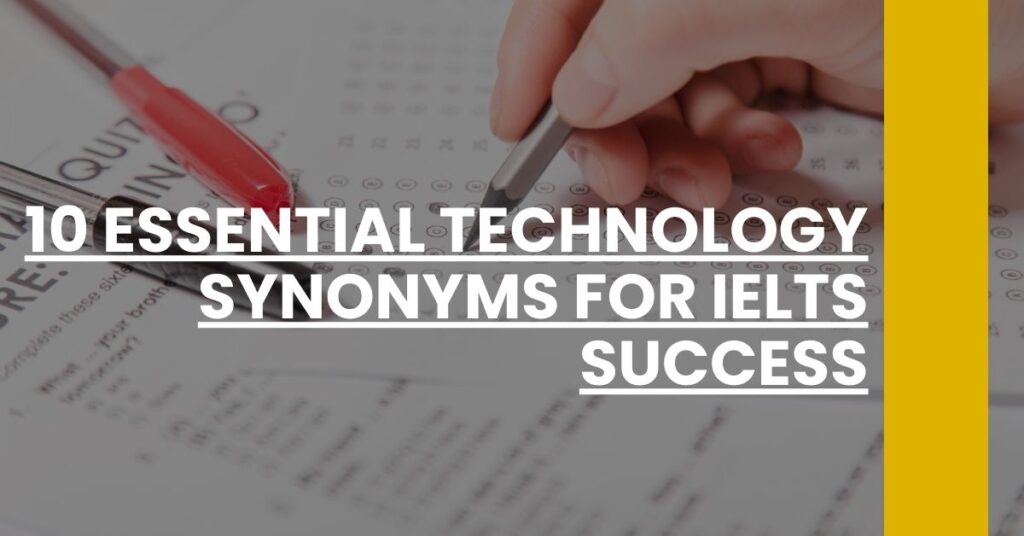Ever wondered how technology synonyms for IELTS can be your secret weapon to acing the test?
Whether you’re a tech enthusiast or simply striving for linguistic finesse, mastering the art of vocabulary variation is a power move in the IELTS arena.
This article distils those elusive tech-based terms into a concentrated guide, equipping you to impress examiners and elevate your score with ease.
- 1. Information Technology: The Digital Foundation
- 2. Communications Network: Connecting the World
- 3. Cutting-Edge Innovations: The Pinnacle of Progress
- 4. Software and Applications: The Virtual Tools
- 5. Cyber Security: The Shield of Digital Space
- 6. Online Platforms: The Stages of the Internet
- 7. Technological Breakthroughs: Milestones of Innovation
- 8. Data Analysis: The Art of Information Interpretation
- 9. Digital Devices: Gadgets and Gizmos Aplenty
- 10. E-commerce: The Marketplace Revolution
- Conclusion: Elevating Your IELTS Vocabulary with Technology Synonyms
1. Information Technology: The Digital Foundation
In the realm of IELTS, your ability to articulate concepts around Information Technology (IT) is paramount. Crucial to our daily lives, IT encompasses a broad spectrum of areas, from software development to hardware management. To impress your evaluators, it’s vital to have an array of technology synonyms for IELTS at your disposal.
- Computer Science: This phrase emphasizes the study and theoretical foundations of information and computation.
- Digital Systems: Refers to the components and processes that make up our computing devices.
- Telecommunications: This is the transmission of information over significant distances by electronic means.
- Network Engineering: Focuses on the design and management of vast networks that keep us interconnected.
- Software Development: Involves the creation of applications or systems that run on computers or other devices.
In discussion or writing tasks, whether you’re describing how telecommunications have evolved or analyzing the importance of network engineering in our hyper-connected world, utilizing these alternatives effectively can significantly enhance your communication.
2. Communications Network: Connecting the World
Today’s society is interlinked more than ever through vast communications networks. These systems are not merely technical frameworks but lifelines that uphold the digital conversations defining our age.
- Connectivity Grids: The intricate web of routes for data transfer that spans the globe.
- Digital Communication Systems: Can refer to the internet or other network architectures facilitating digital dialogue.
- Telecommunication Channels: Emphasizes pathways such as satellites and phone lines enabling long-distance interactions.
You’ll find that a deliberate use of these phrases when discussing tech’s role in global connections can demonstrate your deep understanding of the subject matter. And isn’t that the kind of proficiency we all strive for in IELTS?
3. Cutting-Edge Innovations: The Pinnacle of Progress
“Cutting-edge” is not just a phrase but a narrative of continuous progress in the technological landscape. It signifies more than innovation – it’s the razor-sharp frontier where potential morphs into reality.
- State-of-the-Art Developments: Used to describe the most modern and advanced technologies currently available.
- Pioneering Technologies: Signifies the first of their kind, breaking new ground in their field.
- Trailblazing Innovations: Conveys the idea of leading the charge in creating new tech frontiers.
Integrating terms like these into your IELTS vocabulary bank will not only reflect your fluency but also manifest your grasp on the forward thrust of tech evolution.
4. Software and Applications: The Virtual Tools
Imagine your life without the myriad of software and applications that smooth over daily tasks. In your writing or speaking for IELTS, enriching your vocabulary in this area goes a long way.
- Application Programs: These are specific types of software designed to assist users in performing tasks.
- Digital Solutions: A broader term that envelops various software designed to solve problems or enhance efficiency.
- Computer Applications: Directly references software utilized on desktops or laptops for various functions.
Clever use of these synonyms can invigorate your essays or responses, illustrating a versatile vocabulary that stands out.
5. Cyber Security: The Shield of Digital Space
The term cyber security encapsulates the protective measures and protocols guarding our online sanctity. From personal data to national security, its importance cannot be overstated.
- Information Assurance: This aspect of security ensures that data is reliable and is safeguarded against unauthorized access.
- Network Defense: Encompasses the methods employed to defend computer networks from cyber threats.
- Digital Safeguarding: This term includes all activities designed to protect the integrity of our online presence.
As you navigate descriptive elements within your IELTS tasks, consider these alternative phrases to enrich your conversation about online safety and defense mechanisms.
6. Online Platforms: The Stages of the Internet
Online platforms have redefined how we interact, learn, and conduct business. From social networks to e-learning sites, they are the new town squares of the digital era.
- Virtual Communities: Emphasizes the social aspect and the gathering of individuals around common interests.
- Web Portals: Can refer to sites that provide gateways to a variety of resources and services.
- Internet Forums: Highlights discussion boards which are a bastion for the exchange of ideas and dialogue.
By choosing appropriate terms that resonate with the context, you’ll exhibit a remarkable command of the language, crucial for a stellar IELTS performance.
7. Technological Breakthroughs: Milestones of Innovation
Technological breakthroughs stir the pot of human advancement; they are the game-changing moments that redefine our capabilities.
- Innovative Milestones: Marks significant achievements in creating technology that pushes us forward.
- Advances in Technology: Reflects overall progression in the tech sphere.
- Pioneering Developments: Denotes original and influential innovations paving the way for future creations.
When reflecting on moments of tech evolution in your IELTS writing or speaking tasks, these phrases will serve you well, showcasing a keen insight into the continual transformation that defines our modern world.
8. Data Analysis: The Art of Information Interpretation
The modern world churns out data at an unprecedented rate, and the ability to make sense of this data through Data Analysis has become invaluable. In the context of IELTS, demonstrating knowledge of varied terminology related to this field is a serious plus.
- Statistical Evaluation: This process goes beyond mere numbers to interpret data sets and provides a basis for decision making.
- Information Processing: A term that includes the collection, manipulation, and dissemination of data.
- Quantitative Assessment: Typically used in research, it implies a structured measurement and numerical analysis of data.
When tackling tasks on the IELTS, incorporating these alternatives strategically will not only amplify your technological lexicon but will also showcase your ability to navigate complex concepts with ease.
9. Digital Devices: Gadgets and Gizmos Aplenty
In an age teeming with digital devices, being able to discuss the broad array of technological tools we use daily is a given for the IELTS. But simply repeating ‘digital devices’ won’t cut it. Here’s how you can mix it up:
- Electronic Gadgets: Often referring to portable consumer electronics serving particular functions.
- Smart Technology: Devices that integrate intelligent features, often with the capacity to connect to other devices or networks.
- Tech Appliances: These are the tools and equipment that apply technology for specific uses, typically in the home.
Each term carries nuance and specificity, enabling you to paint a fuller picture of how integral these devices have become to our day-to-day routines and interactions. Knowledge of these technology synonyms for IELTS can truly set you apart.
10. E-commerce: The Marketplace Revolution
The term E-commerce has revolutionized the way we shop and trade. As an IELTS candidate, broadening your vocabulary in this dynamic domain is crucial.
- Online Commerce: Encompasses all financial transactions that occur on the internet.
- Digital Marketplace: Highlights the virtual space where buying and selling of goods and services takes place.
- Internet Retail: A sector within e-commerce, focusing specifically on the sale of goods and services directly to a consumer.
Talking about the global transition from brick-and-mortar stores to digital storefronts requires a variety of lexicon to vividly describe this shift. Leveraging these could elevate your IELTS performance significantly.
Exploring Vocabulary for Internet and Digital Trends
When it comes to keeping your finger on the pulse of the digital age, a robust set of technology synonyms for IELTS is indispensable. Here are some key terms you should be familiar with:
- Internet of Things (IoT): This term describes the network of physical objects embedded with sensors, software, and other technologies to connect and exchange data with other devices over the internet.
- Virtual Reality (VR): A simulated experience that can be similar to or completely different from the real world.
- Augmented Reality (AR): An interactive experience where the objects in the real world are enhanced by computer-generated perceptual information.
Understanding and using these terms effortlessly can greatly enhance your IELTS essays and conversations on tech trends.
The Language of Tech Startups and Entrepreneurship
In the sunlit world of innovation, tech startups and entrepreneurial ventures often use a language all their own. If you’re aiming for IELTS gold, delve into this lingo:
- Bootstrapping: Starting a business from the ground up with minimal capital or outside investment.
- Disruptive Technology: Innovations that significantly alter the way businesses or entire industries operate.
- Scalability: The capability of a system to handle a growing amount of work or its potential to be enlarged to accommodate that growth.
By weaving these terms into your IELTS discourse, you reflect an understanding that transcends basic tech talk and touches on the energizing realm of entrepreneurship.
Technological Vocabulary in Academic and Research Contexts
In scholarly circles, proficiency in technology vocabulary is not just about knowing the keywords; it’s about understanding their implications in academic and research contexts. Consider these terms:
- Empirical Data: Information gained through observation or experimentation.
- Peer-reviewed Journals: Academic publications in which experts scrutinize articles before they are published.
- Proof of Concept (PoC): A demonstration to verify that certain concepts or theories have the potential for real-world application.
As you leverage these terms in your IELTS preparation, you’re not just building your technological vernacular – you’re anchoring it in the rich soil of academia.
Conclusion: Elevating Your IELTS Vocabulary with Technology Synonyms
In conclusion, your IELTS journey is more than learning; it’s an adventure in linguistic mastery. Enrich your responses with engaging synonyms and phrases, depicting not only your proficiency in English but also your savvy in technology. Let this collection of technology synonyms for IELTS be your trusted ally in securing a score commensurate with your ambitions. Keep practicing, exploring, and remember: every term you learn is a step closer to realizing your goal.
Technology synonyms for IELTS applicants: Boost your vocabulary for better scores in speaking and writing with this guide.

